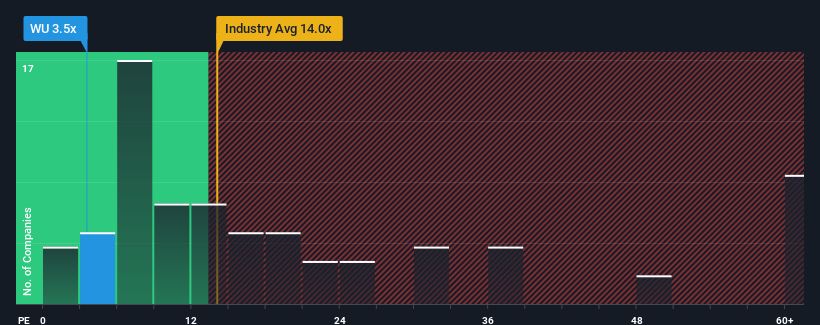- United States
- /
- Diversified Financial
- /
- NYSE:WU
There Is A Reason The Western Union Company's (NYSE:WU) Price Is Undemanding
When close to half the companies in the United States have price-to-earnings ratios (or "P/E's") above 17x, you may consider The Western Union Company (NYSE:WU) as a highly attractive investment with its 3.5x P/E ratio. However, the P/E might be quite low for a reason and it requires further investigation to determine if it's justified.
We've discovered 4 warning signs about Western Union. View them for free.With earnings growth that's superior to most other companies of late, Western Union has been doing relatively well. One possibility is that the P/E is low because investors think this strong earnings performance might be less impressive moving forward. If not, then existing shareholders have reason to be quite optimistic about the future direction of the share price.
See our latest analysis for Western Union

What Are Growth Metrics Telling Us About The Low P/E?
There's an inherent assumption that a company should far underperform the market for P/E ratios like Western Union's to be considered reasonable.
Taking a look back first, we see that the company grew earnings per share by an impressive 63% last year. The latest three year period has also seen an excellent 41% overall rise in EPS, aided by its short-term performance. Therefore, it's fair to say the earnings growth recently has been superb for the company.
Shifting to the future, estimates from the analysts covering the company suggest earnings growth is heading into negative territory, declining 11% per year over the next three years. That's not great when the rest of the market is expected to grow by 10% per annum.
With this information, we are not surprised that Western Union is trading at a P/E lower than the market. However, shrinking earnings are unlikely to lead to a stable P/E over the longer term. There's potential for the P/E to fall to even lower levels if the company doesn't improve its profitability.
The Key Takeaway
Generally, our preference is to limit the use of the price-to-earnings ratio to establishing what the market thinks about the overall health of a company.
As we suspected, our examination of Western Union's analyst forecasts revealed that its outlook for shrinking earnings is contributing to its low P/E. At this stage investors feel the potential for an improvement in earnings isn't great enough to justify a higher P/E ratio. Unless these conditions improve, they will continue to form a barrier for the share price around these levels.
You need to take note of risks, for example - Western Union has 4 warning signs (and 3 which are concerning) we think you should know about.
If you're unsure about the strength of Western Union's business, why not explore our interactive list of stocks with solid business fundamentals for some other companies you may have missed.
Valuation is complex, but we're here to simplify it.
Discover if Western Union might be undervalued or overvalued with our detailed analysis, featuring fair value estimates, potential risks, dividends, insider trades, and its financial condition.
Access Free AnalysisHave feedback on this article? Concerned about the content? Get in touch with us directly. Alternatively, email editorial-team (at) simplywallst.com.
This article by Simply Wall St is general in nature. We provide commentary based on historical data and analyst forecasts only using an unbiased methodology and our articles are not intended to be financial advice. It does not constitute a recommendation to buy or sell any stock, and does not take account of your objectives, or your financial situation. We aim to bring you long-term focused analysis driven by fundamental data. Note that our analysis may not factor in the latest price-sensitive company announcements or qualitative material. Simply Wall St has no position in any stocks mentioned.
About NYSE:WU
6 star dividend payer and undervalued.
Similar Companies
Market Insights
Community Narratives




